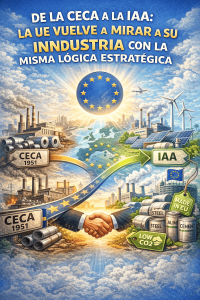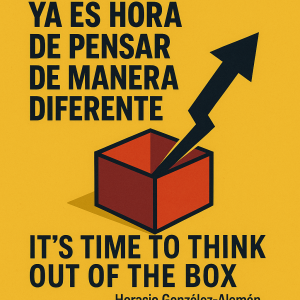REPITE CONMIGO: DESREGULACION
Con el cambio de ciclo institucional la Unión Europea ha entrado también en un cambio de ciclo político, y las cosas empiezan a verse de otra manera.
El giro se inició con la nueva composición del Parlamento Europeo, aunque los Informes de Letta y Draghi también han contribuido a abrir un nuevo camino y a llamar la atención sobre la necesidad de reorientar el modelo europeo.
Esta reorientación pasa por propiciar cambios de fondo que empiezan a ser patentes en los discursos oficiales: “sostenibilidad sí, pero de la mano de la competitividad”; “reforzar el mercado interior”; “simplificar los procedimientos de toma de decisiones”, “reducir las cargas administrativas” … la semántica no es neutra y precisamente por ella empieza el cambio.
Las ultimas piezas del cambio han sido la Brújula de la Competitividad y la Estrategia de Simplificación recientemente presentadas por la Comisión, y otras iniciativas que habrán de venir en las próximas semanas y que seguramente incidirán en la misma línea.
En principio, nada que objetar. Es lo que veníamos pidiendo de manera insistente en los últimos años a la vista de la avalancha normativa del Green Deal y el Farm to Fork.
Sin embargo, echo en falta algo más de decisión y firmeza en lo que hemos visto hasta ahora, y sobre todo que cuesta ver – …otra vez la semántica – la palabra desregulación. La desregulación es igualmente necesaria en este nuevo ciclo, y no es lo mismo que simplificación, sino que va mas allá.
A mi juicio, en estos últimos años se han tomado decisiones legislativas que no solo merecen frenarse, sino que la solución pasa por cuestionarlas a fondo y en su caso eliminarlas. Y no son pocos los órdenes en los que habría que pensar en esa desregulación, que van más allá del sector agroalimentario: la protección de plantas, los coches de combustión, el Europe Beating Cancer Plan, … y alguno que
otro más.
Ya se están tomando algunas decisiones que parece que van en la buena dirección. Pensemos por ejemplo en el anuncio de Von der Leyen presentando una iniciativa ómnibus para fundir en una sola norma las obligaciones impuestas por las Directivas CSRD y CS3D y el reglamento taxonomía financiera. O el Reglamento deforestación (EUDR), que en diciembre pasado se aplazó in extremis su aplicación un año al comprender que su aplicación iba a ser imposible [1]. Pero siguen estando presentes tics como la falta de consulta en la iniciativa ómnibus o la puesta en marcha de la revisión del EUDR…cuando todavía no se ha aplicado (kafkiano).
Pero salvando estos detalles, esperemos que esto no haya hecho más que empezar y que todo lo que se predica sea cierto. Y que vayamos más allá de la simplificación administrativa, …Repitamos todos, “desregulación”, y nos lo acabaremos creyendo.
[1] No he visto una norma comunitaria más mal concebida que este reglamento,…
*************************************************************************
DEREGULATION IS MORE THAN SIMPLIFICATION
With the new institutional cycle the European Union is experiencing important political changes, and things are starting to look different.
The shift began with the new composition of the European Parliament, although the Letta and Draghi Reports have also helped to open up a new path and draw attention to the need to reorient the European model.
This reorientation involves promoting fundamental changes that are beginning to be evident in the official discourse: ‘sustainability yes, but hand in hand with competitiveness’; ‘strengthening the internal market’; ‘simplifying decision-making procedures’, ‘reducing administrative burdens’ … semantics is not neutral and it is precisely because of this that change is beginning.
The latest pieces of the puzzle have been the Compass of Competitiveness and the Simplification Strategy recently presented by the Commission, and other initiatives to come in the next weeks that will surely follow the same line.
In principle, nothing to object to. It is what we had been insistently calling for in recent years, in view of the avalanche of regulations from the Green Deal and Farm to Fork Strategies.
However, I find that what we have seen so far lacks a little more decisiveness and firmness. And above all, it is difficult to see – …semantics again – the word deregulation. Deregulation is equally necessary in this new cycle, and it is more than simplification.
In my opinion, some legislative decisions have been made in recent years that deserve to be stopped and, if necessary, eliminate them.
There are many areas in which we should be thinking about this deregulation, going from issues like plant protection to others like gasoline engines, measures against cancer, … and a few others.
.
Some decisions are already being taken that seem to be moving in the right direction. Consider, for example, Von der Leyen’s announcement presenting an omnibus initiative to merge into a single rule the obligations imposed by the CSRD and CS3D Directives and the financial taxonomy Regulation. Or the EU Deforestation Regulation (EUDR), whose implementation was postponed for a year at the very last-minute last December, when it became clear that its implementation was going to be impossible [1].
Let’s hope that this has only just begun, and life will be easier for companies. And that we will go beyond administrative simplification and include the word ‘deregulation’ in the new policies.
[1] I have not seen a community regulation more ill-conceived than this regulation, …
[/vc_column_text][/vc_column][/vc_row]






